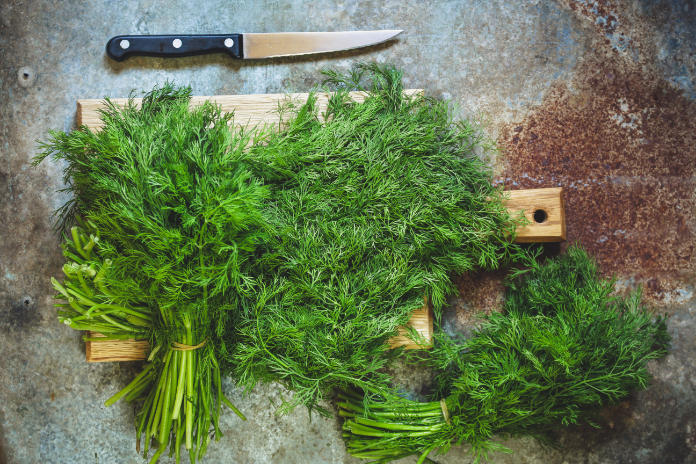We have compiled expert advice in the form of an article on the 7 health benefits of eating dill during pregnancy. Read on to know everything about dill, whether it is safe for pregnancy, its benefits, and side effects.
As a pregnant woman, you must have had countless people give advice on what to eat and what not to eat. Maybe some people are well-meaning and have good intentions. But more often than not, a lot of people feel that they are entitled to give you advice. Or as a matter of fact, boss you around on the account of considering themselves as experts on pregnancy and motherhood. As it is pregnancy can be very stressful, and on top of this, such things can cause great distress. But you should always remember that your doctor and you would know your body and your baby the best.
What is dill?
Dill could also be a perennial herb belonging to the family of Apiaceae. People usually use the herb for their culinary and medicinal requirements. The flavor of this herb could be described as tangy and appetizing. The taste and flavor come from flavonoids, amino acids, minerals, and chemical compounds popular as monoterpenes. These compounds are beneficial for your health.
Is it safe to use dill during pregnancy?
Yes, you’ll use dill during pregnancy just for your culinary purposes in small quantities. You can have a touch of a pickle during pregnancy. But you should try to avoid using concentrated dill oil during pregnancy. It’s proved to be harmful to your health and to your fetus. Also, avoid using more than dill in pregnancy because it can promote menstruation and put your pregnancy in danger. Dill seeds and leaves provide are known to have medicinal effects. But it is advisable to avoid therapeutic doses while expecting a child. In a nutshell, only consume dill if your doctor approves it.
7 health benefits of eating dill during pregnancy
If you use dill for culinary purposes during pregnancy, then it can help you derive its many health benefits. Those include but are not limited to:
Protects from bacterial infection
Having dill during pregnancy protects you from harmful bacterial infections, among other things. The anti-bacterial effects of the herb prevent the expansion and expansion of bacteria and related ailments resulting thanks to it.
Prevents free-radical activity
Dill has powerful antioxidant properties that help protect your body from the harmful effects of free radicals. The herb neutralizes free radicals and therefore prevents oxidative stress during pregnancy.
Promotes bone health
Dill is rich in calcium. Calcium is an important mineral that protects you from the loss of bone mineral density. The herb safeguards you from the danger of osteoporosis during pregnancy. Having dill also contributes to appropriate bone growth and development within the fetus, reparation of injured bones, and promotes bone health.
Regulates cholesterol
Using it in your diet regulates your blood cholesterol levels and blood sugar levels to a great extent.
Treats anemia
Dill leaves are a fantastic source of the mineral iron. If you add the leaves of the herb to your regular diet, it helps in boosting your iron levels and hemoglobin count substantially. Thus, it helps treat anemia and its symptoms, like fatigue, effectively during pregnancy.
Detoxify your body
It has mineral magnesium, which helps in detoxifying your body during pregnancy. The mineral is additionally beneficial for your bones.
Cures dysentery
Dysentery results due to fungal infections. Dill acts as a disinfectant and controls fungal infections effectively.
Side effects of dill during pregnancy
Even though there are numerous health benefits of eating it during pregnancy, excessive utilization of this herb can prove harmful. The side effects of eating it during pregnancy are as follows:
- Stimulate menstruation as it acts as a period inducing food
- Miscarriage
- Skin irritation
Conclusion
Therefore, to conclude, dill during pregnancy posits a mixed bag of benefits and side effects. On one hand, there are innumerable benefits of this tasty herb. On the opposite hand, there are side effects too. The key is to remember that moderation is everything. Regular checkups with your doctor will ensure that you are not consuming anything that is not good for you and your baby.
References
https://www.ncbi.nlm.nih.gov/pmc/articles/PMC3249919/
https://www.organicfacts.net/health-benefits/seed-and-nut/.html













